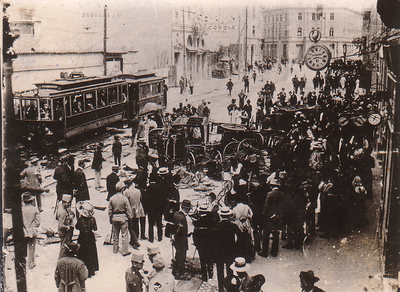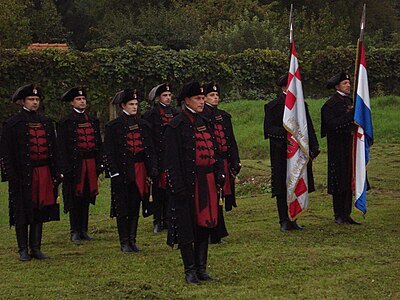((Tally. Both revolutions are currently succeeding, meaning if the vote ended now it would certainly prompt a civil war.))
Totals:
Anti-Regime Revolution: 10/12/1 [384, 238, 1] [61.7%]
Pro-Regime Revolution: 12/10/1 [238, 384, 1] [38.3%]
((EDIT: Corrected for counting errors.))
Aristocrats: [14]
Anti-Regime Revolution: 0/1/0 [0, 14, 0]
Pro-Regime Revolution: 1/0/0 [14, 0, 0]
Contravarius: [6]
Anti-Regime Revolution: 0/1/0 [0, 6, 0]
Pro-Regime Revolution: 1/0/0 [6, 0, 0]
Industrialists: [7]
Anti-Regime Revolution: 1/0/0 [7, 0, 0]
Pro-Regime Revolution: 0/1/0 [0, 7, 0]
Terraferma: [14]
Anti-Regime Revolution: 0/0/0 [0, 0, 0]
Pro-Regime Revolution: 0/0/0 [0, 0, 0]
Nodscouterr & mrlifeless: [9]
Anti-Regime Revolution: 0/0/0 [0, 0, 0]
Pro-Regime Revolution: 0/0/0 [0, 0, 0]
Militarists: [12]
Anti-Regime Revolution: 1/3/0 [12, 36, 0]
Pro-Regime Revolution: 3/1/0 [36, 12, 0]
Revan529: [13]
Anti-Regime Revolution: 0/1/0 [0, 13, 0]
Pro-Regime Revolution: 1/0/0 [13, 0, 0]
Firehound15: [30]
Anti-Regime Revolution: 0/0/0 [0, 0, 0]
Pro-Regime Revolution: 0/0/0 [0, 0, 0]
Marschalk: [19]
Anti-Regime Revolution: 0/1/0 [0, 19, 0]
Pro-Regime Revolution: 1/0/0 [19, 0, 0]
Gen. Marshall: [30]
Anti-Regime Revolution: 0/0/0 [0, 0, 0]
Pro-Regime Revolution: 0/0/0 [0, 0, 0]
Mikkel Glahder: [39]
Anti-Regime Revolution: 0/1/0 [0, 39, 0]
Pro-Regime Revolution: 1/0/0 [39, 0, 0]
Andre Massena: [14]
Anti-Regime Revolution: 0/1/0 [0, 14, 0]
Pro-Regime Revolution: 1/0/0 [14, 0, 0]
Labor Leaders: [14]
Anti-Regime Revolution: 0/0/0 [0, 0, 0]
Pro-Regime Revolution: 0/0/0 [0, 0, 0]
Dadarian & TJDS: [14]
Anti-Regime Revolution: 2/0/0 [28, 0, 0]
Pro-Regime Revolution: 0/2/0 [0, 28, 0]
Antigov Demagogues: [67]
Anti-Regime Revolution: 3/0/0 [201, 0, 0]
Pro-Regime Revolution: 0/3/0 [0, 201, 0]
VibrantiumTaco: [70]
Anti-Regime Revolution: 1/0/0 [70, 0, 0]
Pro-Regime Revolution: 0/1/0 [0, 70, 0]
Otto of england: [73]
Anti-Regime Revolution: 0/1/0 [0, 73, 0]
Pro-Regime Revolution: 1/0/0 [73, 0, 0]
Progov Demagogues: [1]
Anti-Regime Revolution: 0/1/0 [0, 1, 0]
Pro-Regime Revolution: 1/0/0 [1, 0, 0]
Bonus: [0]
Anti-Regime Revolution: 0/0/0 [0, 0, 0]
Pro-Regime Revolution: 0/0/0 [0, 0, 0]
Politicians: [1]
Anti-Regime Revolution: 2/1/1 [2, 1, 1]
Pro-Regime Revolution: 1/2/1 [1, 2, 1]
Anti-Regime Revolution: 0/1/0 [0, 14, 0]
Pro-Regime Revolution: 1/0/0 [14, 0, 0]
Contravarius: [6]
Anti-Regime Revolution: 0/1/0 [0, 6, 0]
Pro-Regime Revolution: 1/0/0 [6, 0, 0]
Industrialists: [7]
Anti-Regime Revolution: 1/0/0 [7, 0, 0]
Pro-Regime Revolution: 0/1/0 [0, 7, 0]
Terraferma: [14]
Anti-Regime Revolution: 0/0/0 [0, 0, 0]
Pro-Regime Revolution: 0/0/0 [0, 0, 0]
Nodscouterr & mrlifeless: [9]
Anti-Regime Revolution: 0/0/0 [0, 0, 0]
Pro-Regime Revolution: 0/0/0 [0, 0, 0]
Militarists: [12]
Anti-Regime Revolution: 1/3/0 [12, 36, 0]
Pro-Regime Revolution: 3/1/0 [36, 12, 0]
Revan529: [13]
Anti-Regime Revolution: 0/1/0 [0, 13, 0]
Pro-Regime Revolution: 1/0/0 [13, 0, 0]
Firehound15: [30]
Anti-Regime Revolution: 0/0/0 [0, 0, 0]
Pro-Regime Revolution: 0/0/0 [0, 0, 0]
Marschalk: [19]
Anti-Regime Revolution: 0/1/0 [0, 19, 0]
Pro-Regime Revolution: 1/0/0 [19, 0, 0]
Gen. Marshall: [30]
Anti-Regime Revolution: 0/0/0 [0, 0, 0]
Pro-Regime Revolution: 0/0/0 [0, 0, 0]
Mikkel Glahder: [39]
Anti-Regime Revolution: 0/1/0 [0, 39, 0]
Pro-Regime Revolution: 1/0/0 [39, 0, 0]
Andre Massena: [14]
Anti-Regime Revolution: 0/1/0 [0, 14, 0]
Pro-Regime Revolution: 1/0/0 [14, 0, 0]
Labor Leaders: [14]
Anti-Regime Revolution: 0/0/0 [0, 0, 0]
Pro-Regime Revolution: 0/0/0 [0, 0, 0]
Dadarian & TJDS: [14]
Anti-Regime Revolution: 2/0/0 [28, 0, 0]
Pro-Regime Revolution: 0/2/0 [0, 28, 0]
Antigov Demagogues: [67]
Anti-Regime Revolution: 3/0/0 [201, 0, 0]
Pro-Regime Revolution: 0/3/0 [0, 201, 0]
VibrantiumTaco: [70]
Anti-Regime Revolution: 1/0/0 [70, 0, 0]
Pro-Regime Revolution: 0/1/0 [0, 70, 0]
Otto of england: [73]
Anti-Regime Revolution: 0/1/0 [0, 73, 0]
Pro-Regime Revolution: 1/0/0 [73, 0, 0]
Progov Demagogues: [1]
Anti-Regime Revolution: 0/1/0 [0, 1, 0]
Pro-Regime Revolution: 1/0/0 [1, 0, 0]
Bonus: [0]
Anti-Regime Revolution: 0/0/0 [0, 0, 0]
Pro-Regime Revolution: 0/0/0 [0, 0, 0]
Politicians: [1]
Anti-Regime Revolution: 2/1/1 [2, 1, 1]
Pro-Regime Revolution: 1/2/1 [1, 2, 1]
Totals:
Anti-Regime Revolution: 10/12/1 [384, 238, 1] [61.7%]
Pro-Regime Revolution: 12/10/1 [238, 384, 1] [38.3%]
((EDIT: Corrected for counting errors.))
Last edited:








